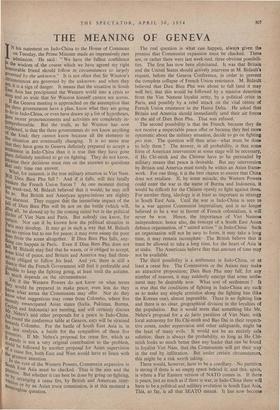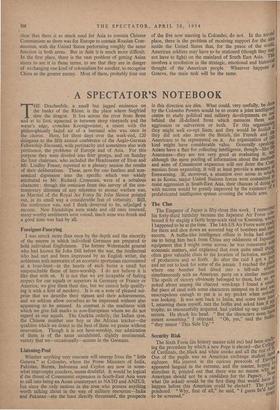THE MEANING OF GENEVA I N his statement on Indo-China to
the House of Commons on Tuesday, the Prime Minister made an impressively rare admission. He said : " We have the fullest confidence [II the wisdom of the course which we have agreed my right °Pourable friend should follow in circumstances so largely governed by the unknown." It is not often that Sir Winston's Lireumstances are governed by the unknown; and when they F,e, it is a sign of danger. It means that the situation in South fast Asia has precipitated the Western world into a crisis so uel) and so wide that Sir Winston himself cannot see across. If the Geneva meeting is approached on the assumption that °_, three governments have a plan, know what they are going do in Indo-China, or even have drawn up a list of hypotheses, rxneir recent pronouncements and activities are completely in- . mprehensible. But the truth, as Sir Winston has now plained, is that the three governments do not know anything Of the kind; they cannot know because all the elements in the situation are continually changing. It is no more true that they have gone to Geneva definitely prepared to accept a settlement in Indo-China than it is true that they have gone !here definitely resolved to go on fighting. They do not know, because their decisions must rest on the answers to questions that only time can answer. What, for instance, is the true military situation in Viet Nam. b, Weaken Dien Bien Phu fall ? And if it falls, will this fatally i'veaken the French Union forces ? At one moment during !ast week-end, M. Bidault believed that it would; he may still d0 so. But British and American appreciations are slightly less alarmist. They suggest thh the immediate impact of the 141.1 of Dien Bien Phu will be not on the battle (which will, t5ter all be slowed up by the coming rains) but in the political Certain. of Viet Nam and Paris. But nobody can know, for rtain. Nor can it be known how the political situation in 1, Paris may develop. It may go in such a way that M. Bidault ;14.8 no option but to sue for peace; it may even sweep the poor tlIat11 from the scene altogether. If Dien Bien Phu falls, any- ta;,ag can happen in Paris. Even if Dien Bien Phu does not to'. M. Bidault may find that he wants, or is obliged to accept, 4011° kind of peace, and Britain and America may find them- e', yes obliged to follow his lead. And yet, there is still a `,`,411°e that the French Government will find it preferable and EouSSIble to keep the fighting going, at least until the autumn. Yet depends on the circumstances. Sao'. et if the Western Powers do not know on what terms would be prepared to make peace, even less do they 4W what terms the Communists may offer. Nor do they r,,L3w what suggestions may come from Colombo, where five C,ttlY emancipated Asian states (India, Pakistan, Burma. kr3lert and Indonesia) are meeting, and will certainly discuss Ail' Nehru's and other proposals for a peace in Indo-China. .i,,_ round the conference table at Geneva, ears will be strained ,,-earcis Colombo. For the battle of South East Asia is, in r41.. last analysis, a battle for the sympathies of these five it Stands If Mr. Nehru's prOposal for cease fire, which as couuands is not a very original contribution to the problem, of :I he followed by another proposal for Asian supervision the cease fire, both East and West would have to listen with sourthe attention. Boughe eyes of the Western Powers, Communist expansion in premiss. East Asia must be checked. That is the aim and the The real question is what can happen, always given the premiss that Communist expansion must be checked. There are, or rather there were last week-end, three obvious possibili- ties. The first has now been eliminated. It was that Britain and the United States should actively intervene at M. Bidault's request, before the Geneva Conference, in order to prevent the complete collapse of French Union resistance. M. Bidault believed that Dien Bien Phu was about to fall (and it may well be); that this would be followed by a massive desertion from the Viet Namese loyalist army, by a political crisis in Paris, and possibly by a rebel attack on the vital centre of French Union resistance in the Hanoi Delta. He asked that Britain and America should immediately send their air forces to the aid of Dien Bien Phu. That was refused.
The second possibility is that the French, because they do not receive a respectable peace offer or because they feel more optimistic about the military situation, decide to go on fighting pro tern. The question will then arise—what must be done to help them ? The answer, in all probability, is that some form of American intervention at some stage will be necessary, if Ho Chi-minh and the Chinese have to be persuaded by military means that peace is desirable. But any intervention by Britain and America must surely be within an Asian frame- work. For one thing, it is the best chance to ensure that Chins does not retaliate. If, by some miracle, the Western Powers could enter the war in the name of Burma and Indonesia, it would be difficult for the Chinese openly to fight against them. For another thing, ideology is at least as important as strategy in South East Asia. Until the war in Indo-China is seen to be a war against Communist imperialism, and is no longer believed to be a war in favour of French colonialism, it will never be won. Hence, the importance of Viet Names* independence; hence also, the concept of a South East Asian defence organisation, of " united action " in Indo-China. Such an organisation will not be easy to form, it may take a long time, it may remain incomplete. The British believe that it must be allowed to take a long time, for the heart of Asia is at stake. The Americans believe that that amount of time may not be available: The' third possibility is a settlement in Indo-China, or at least a cease fire. The Communists or the Asians may make an attractive proposition; Dien Bien Phu may fall; for any number of reasons, it may suddenly emerge that some settle- ment may be desirable now. What sort of settlement ? It is true that the conditions of fighting in Indo-China are such as to make any simple armistice along the fighting line (like the Korean one), almost impossible. There is no fighting lino and there is no clear, geographical division in the loyalties of the population. But it would seem that something like Mr. Nehru's proposal for a de facto partition of Viet Nam, with local autonomy for Ho Chi-minh and Bao Dai in their respect- tive zones, under supervision and other safeguards, might be the least of many evils. It would not be an entirely safe solution; there is always the probability, so long as Ho Chi- minh looks so much better than any leader that can be found in loyalist Viet Nam, that the Communists will get their way in the end by infiltration. But under certain circumstances, this might be a risk worth taking.
There would, however, have to be a corollary. No partition is strong if there is an empty space behind it; and this, again, is where a Far Eastern version of NATO comes in. If there is peace, just as much as if there is war, in Indo-China there will have to be a political and military evolution in South East Asia, This, so far, is all that SEATO means. It has now become clear that there is as much need for Asia to contain Chinese Communism as there was for Europe to contain Russian Com- munism, with the United States performing roughly the same function in both areas. But in Asia it is much more difficult. In the first place, there is the vast problem of getting Asian states to see it in those terms, to see that they are in danger of exchanging one kind of colonialism for another, to recognise China as the greater enemy. Most of them, probably four out of the five now meeting in Colombo, do not. In the second place, there is the problem of receiving support for the idea inside the United States that, for the peace of the American soldiers may have to be stationed (though they _.„,111231 not have to fight) on the mainland of South East Asia. involves a revolution in the strategic, emotional and historical thought of the American people. Whatever happens at Geneva, the main task will be the same. worlds



































 Previous page
Previous page